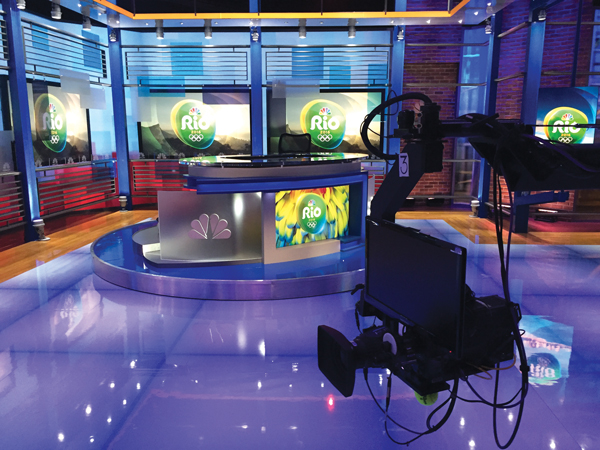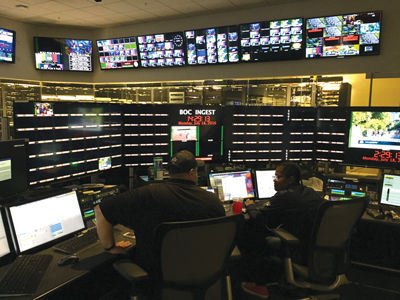The neighborhood surrounding NBC Sports’ headquarters in Stamford, Conn., is no Copacabana Beach. But however mundane its exterior, its interior will transform into Rio North for three weeks in August.
NBC Sports is expanding its at-home operation for the Rio Games to unprecedented levels, taking advantage of its spacious, 3-year-old suburban digs for the first time during a Summer Olympics. More than 1,100 employees, interns and contractors will work early morning to late night from Connecticut, helping deliver NBC’s promised 6,755 hours of programming across 11 different channels. By comparison, 2,000 are heading to Rio for NBC.
 |
NBC Sports’ Connecticut operation will provide the production and broadcast calls for all or part of 22 sports being contested in Rio.
Photo by: BEN FISCHER / STAFF
|
The 2014 Sochi Winter Olympics gave the facility a workout when it was new, but the far larger Summer Games will test the infrastructure and employees in new ways. Then, NBC broadcasters called one sport — curling — from the facility. This year, all or part of 22 sports will be primarily called and produced domestically, relying on more than 60 broadcasters watching standard Olympic Broadcasting Service feeds from Stamford.
NBC Olympics Executive Producer Jim Bell said the network’s commitment to air all the action — not just the core revenue-driving Olympic sports like gymnastics and swimming — wouldn’t be possible without the at-home operation. It’s also a way of complying with an International Olympic Committee directive to travel lightly.
“We have always concentrated the most resources on the venues that drive our prime-time show, which is what most viewers experience,” Bell said. “Over the past two decades, advances in technology and excellent coverage provided by OBS has allowed us to expand our coverage exponentially without breaking the bank.”
Announcers Row
In some ways, the centerpiece of the at-home effort is Studio 4. The entire space is crammed with 13 enclosed black cubes measuring about 10 feet on each side, packed side by side, with a control desk in the front.
When viewers tune into fencing or rugby, for instance, the broadcasters will be in those cramped booths, watching feeds from Rio and describing the action. Their producers sit inside the same booth, but on the other side of an interior wall, with a small window to see each other.
Outside the soundproof boxes, another producer sits at the control desk, with video feeds showing the inside of the tiny booths, the actual live feed from Rio and other parts of the broadcast.
 |
Photo by: BEN FISCHER / STAFF
|
Five more of those announcer booths are spread throughout the NBC facility, making it possible to call 18 different events at once in that manner.
Six other permanent studios are assigned more conventional tasks, providing the backdrop for Olympic studio shows on USA Network, MSNBC, CNBC, Bravo or one of the digital-only specials that NBC will produce domestically, like Gold Zone (live peak action cut-ins) or the gymnastics special Daily Dismount. In addition, they’ll do hourly updates from a stage set up in the NBCOlympics.com newsroom. On the loading dock in the back of the building, the team will also back in a mobile production truck to help.
Highlights Factory
In a desktop computer lab surrounded by massive monitors on one side and a full-wall mural depicting Christ the Redeemer and Guanabara Bay in Rio, 70 editorial employees will be tasked with rapidly producing highlight packages day and night.
NBC will be capable of streaming up to 40 live feeds at once (sometimes several in a single sport), and every second of footage will be watched by a designated “shot selector.” They’ll mark crucial moments and create a “shots list” for editor-producers — preditors, in the vernacular — and move on to the next event. Armed with those eyewitness accounts, producers will then rapidly produce game wrapup packages, athlete features and news-of-the-day summary packages for use across NBC.
 |
Photo by: BEN FISCHER / STAFF
|
These people will work 10-hour shifts, at least to start, said Eric Hamilton, director of digital video production. Some of them are specialists — the highlights team includes 2008 silver-medal gymnast Bridget Sloan, several Division I college athletes in wrestling, volleyball, swimming and a national team fencer, Hamilton said.
Managing It All
No one aspect of this operation is unfamiliar to the team, but the unprecedented volume of content is a challenge. In total, Stamford studios will have 120 feeds of content coming into the studios from Rio.
“At this point, the hard part is coordination,” said Tim Canary, vice president of engineering.
Meanwhile, the rest of NBC Sports carries on, side by side to the Olympics. For instance, on Aug. 20, NBC will be broadcasting the Olympics, English Premier League soccer and the NASCAR Sprint Cup Series race from Bristol, Tenn.
The year’s greatly expanded workload sounds daunting, but two things have the team looking on the bright side: First, they’re no longer in the iconic but cramped studios of 30 Rockefeller Center in Manhattan, where they produced the Olympics until 2014. Secondly, their brief “overnight” breaks will actually coincide with normal sleeping hours, unlike during the Sochi or London Games. “It seems luxurious compared to Sochi,” Hamilton said. “It affects our day a lot. When it was nine hours [difference], we were essentially here all the time.”






